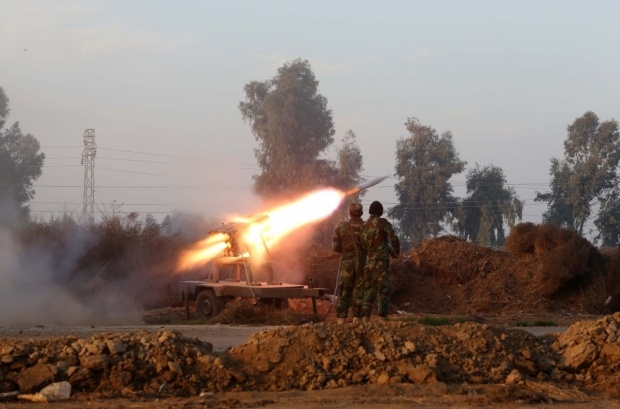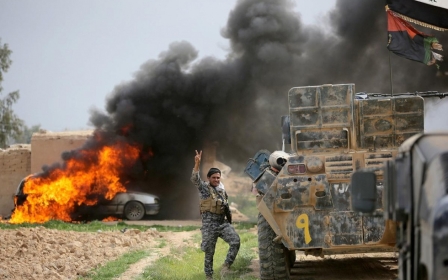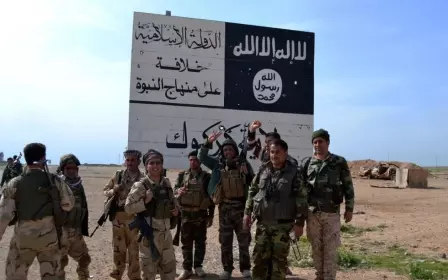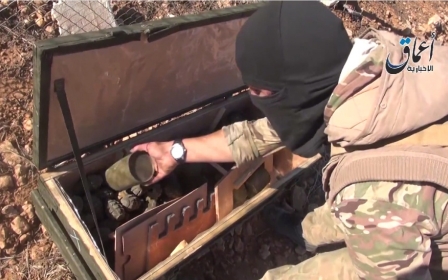Obama’s Syria plan doomed, former US ambassador says

Since ending his four-year stint as US ambassador to Syria last year, Robert Ford has grown increasingly critical of White House policy there. President Barack Obama’s plan to destroy Islamic State is not working, he says, as Syrian President Bashar al-Assad clings to power.
In an interview with Middle East Eye, the former envoy explains why the US and its allies must increase airstrikes and boost support to moderate Syrian rebels through a unified military command – or the US should simply give up on beating IS there and pull out.
MEE: How do you rate Obama’s strategy on Syria?
Ford: I’m not sure the president has a clearly defined goal on containing and reducing IS in Syria and I don’t understand what his strategy is, if that is in fact his goal. His strategy won’t work because it doesn’t address IS recruitment, which comes out of the brutality of Assad’s regime. That’s why we need a negotiated political solution to deal with this Syrian government’s brutality. In Iraq, the US has a goal of a political reconciliation and national unity government to rally Sunnis, Shiites and Kurds to fight together and roll back IS. We should have the same strategy in Syria.
MEE: What strategy do you propose?
Ford: The overall goal in Syria should be to protect ourselves from extremists who threaten us. The best strategy for achieving that is to have a Syrian national unity government to mobilise the vast majority of Syrians to eject extremists from Syrian soil, eventually. If we can’t figure out a way to get to a national unity government then we should stop intervening inside Syria and instead devise other defensive moves; perhaps allocating resources to homeland security or working with Turkey, Jordan and Lebanon to intercept people leaving Syria at its border.
MEE: A national unity government … with Assad in or out?
Ford: It’s not for me to decide; that’s for Syrian negotiators. I wouldn’t presume to tell Syrians what to do. Some trade-offs may be possible. My opinion is that it’s hard to imagine how a leader who has ordered chemical weapons and the indiscriminate bombing of civilians could be in that government. But it won’t be me who negotiates, or accepts the results. It will be the people fighting on the ground, on both sides. I expect a long and difficult negotiation; and they’re very far from even that negotiation now.
MEE: Should the US arm moderate rebels?
Ford: First we must decide what we want. Do we seriously want to create an indigenous Syrian force that implements a strategy that moves us towards negotiation and has a real chance of containing IS? That’s a decision the US must make for itself. If Americans decide to go that way, it means a lot more arms, training and equipment to the moderate opposition, expanding the air mission – probably to include a no-fly zone. It also means we cannot do anything without regional allies helping us. If the Turks won’t shut the border and continue letting IS and al-Nusra Front operate freely along its border, there’s no sense doing this because any moderates we train will end up fighting the extremists as well as Assad. The Turks have to make changes; the allies have to make changes. They can’t all keep favouring their own client groups.
There must be a unified armed opposition command structure through which all material and financial assistance flows. The Saudis, the Turks, the Qataris, the French – all countries providing material assistance to the armed opposition haven’t wanted that. If all these countries protect particular little client groups, the strategy I’ve laid out won’t work, and it’s better to walk away. Because the opposition will always be divided, and it will never get anywhere against IS or Assad.
MEE: Wouldn’t Assad be a better US partner for defeating IS?
Ford: Assad can’t even recapture the suburbs of Damascus. The media keeps on saying that Assad is the strongest fighting force in Syria, but what is the basis for that conclusion? The fact that the rebels haven’t taken downtown Damascus. The regime has taken terrible casualties up north and has ground to a halt in the south. The broader question is why you would link up with Assad, whose brutality is aggravating the extremist problem. If you link up with Assad, you can kill lots of IS fighters, but it will replace its losses.
MEE: Should the US Congress grant an Authorisation for Use of Military Force (AUMF)?
Ford: I don’t think there should be US forces on the ground in Syria. We made a hash of things in Iraq. The people who can best contain extremism in Syria are Syrians, not Americans. But I like the AUMF for two reasons. First, the air mission is almost certainly going to have to expand if we’re going to have an indigenous Syrian force on the ground containing IS and al-Nusra Front and pressuring the Syrian regime. A strong congressional vote in favour of an AUMF will send a powerful statement to the Russians, the Iranians, the Assad regime, the Iraqi government and the Shia militias. It would be saying: “You’ve brought us to the point where now American intervention by air is necessary to help contain this problem that you all created; and so now we mean business.”
MEE: Is Iran helping or hindering US goals?
Ford: There’s an analysis among some parts of the US administration that if we are hostile against Assad’s forces in Syria, an Iranian ally, then Shiite militias in Iraq, at Iran’s behest, will attack US advisors on the ground in Iraq. In a sense, the Americans postulate that US forces in Iraq are hostage to our benign behaviour in Syria. I would say that is a mistake for two reasons. One, Iran will decide on its own whether or not US airstrikes are useful against IS in Iraq or not. Two, when Iran reaches that conclusion, as soon as they decide that American airstrikes against Islamic State in Iraq are not useful, they will promptly try to remove US forces out of Iraq, like they did previously. Iran doesn’t want US forces long-term in Iraq. It has nothing to do with what we do in Syria.
New MEE newsletter: Jerusalem Dispatch
Sign up to get the latest insights and analysis on Israel-Palestine, alongside Turkey Unpacked and other MEE newsletters
Middle East Eye delivers independent and unrivalled coverage and analysis of the Middle East, North Africa and beyond. To learn more about republishing this content and the associated fees, please fill out this form. More about MEE can be found here.




